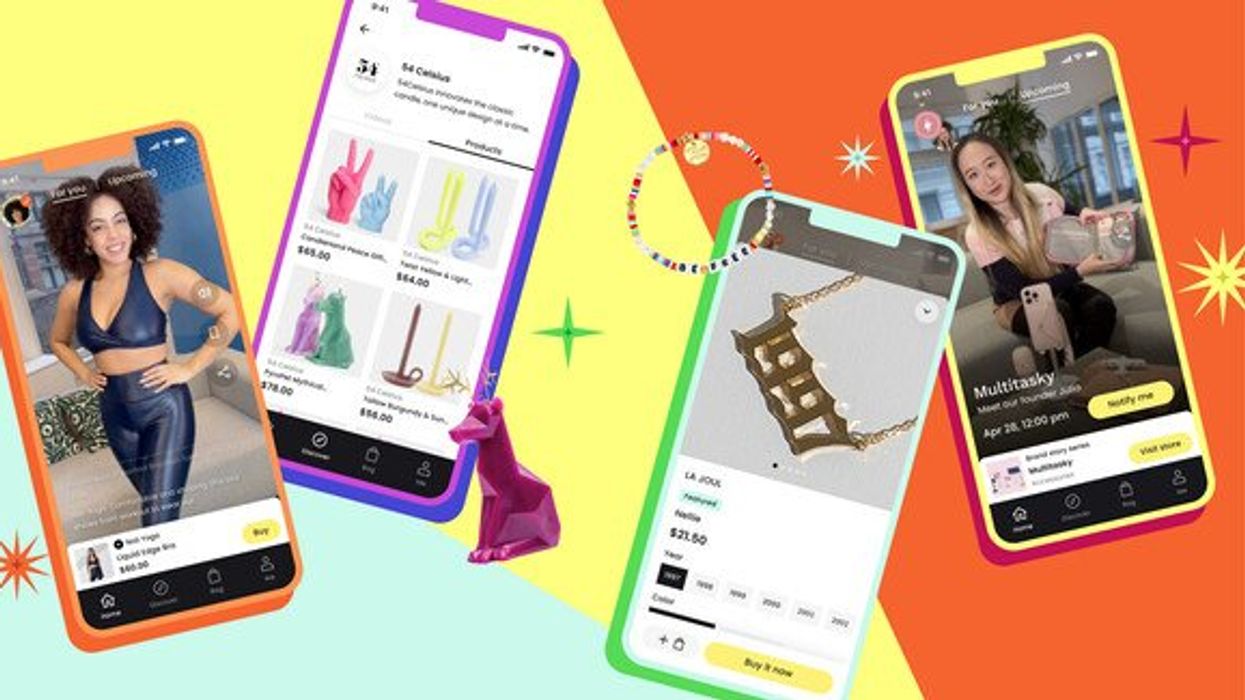Retail Channels
05 April 2023
Livestream shopping app sune aims to provide 'joyful' experience
sune is backed by QVC owner Qurate Retail Group.

sune is backed by QVC owner Qurate Retail Group.

The rise of TikTok and debate over whether livestreaming will succeed in the U.S. can bring heated opinions in ecommerce.
But look at the actual shopping experiences involved in each of these elements, and you’ll find something that’s a bit more uplifting. A fledgling group of apps are leveraging content and a penchant for social media to create a more engaging and fun online shopping experience.
Now, a new app backed by QVC parent company Qurate Retail Group is entering the fray.
Sune is launching with an aim to provide educating and entertaining videos and livestreams that inspire shopping.
The goal is to harness video content that allows makers, creators and founders to tell their story to audiences. In turn, consumers will be able to purchase products directly from a feed. It’s all designed to provide a form of “window shopping” via ecommerce.
"Unlike other shopping apps, sune's mission is to provide a joyful, inspirational, and relaxing experience, where users can easily connect and directly engage with remarkable 'under-discovered' products from new and emerging brands, and ultimately witness entertaining content based on their personal shopping preferences," said Brian Beitler, Founder of sune and General Manager of Live Shop Ventures LLC, in a statement. "Our goal, as the beta version of sune evolves, is to elevate mission-driven brands to share their stories and products, while offering new ways for the younger generations to shop by leveraging live and live-like video commerce."
In the coming months, the app will introduce creators and brands that it says are undiscovered in currently-used shopping platforms. Additionally, sune will feature a calendar of live product drops.
Here’s how the experience will look for each constituency:
Users will have a customized experience to their preferences and purchase history, including personalized recommendations and filters. The app will aim to provide discovery and inspiration, then provide direct shopping.
Creators, brand founders, hosts – called "sunesetters” – and influencers will have opportunities to build authentic connections, as well as improve discovery and engagement.
Sellers will have access to tools that help to manage their assortment, inventory, pricing, and shipping costs, while maintaining full control over their storefronts, the app said.
Brands will be able to access proprietary in-house studio software, remote co-hosting and guidance on video creation.
What it means for ecommerce: A beta launch likely won't settle any debates about livestreaming's viability in the West, but at a time when TikTok is facing calls for a ban, it shows that the discovery-focused, personalized, video-based style that it brought to the user experience is likely going to be here to stay.
Labor disputes on the West Coast could cause further disruption heading into peak season.
When the first half of 2023 is complete, imports are expected to dip 22% below last year.
That’s according to new data from the Global Port Tracker, which is compiled monthly by the National Retail Federation and Hackett Associates.
The decline has been building over the entire year, as imports dipped in the winter. With the spring, volume started to rebound. In April, the major ports handled 1.78 million Twenty-Foot Equivalent Units. That was an increase of 9.6% from March. Still it was a decline of 21.3% year over year – reflecting the record cargo hauled in over the spike in consumer demand of 2021 and the inventory glut 2022.
In 2023, consumer spending is remaining resilient with in a strong job market, despite the collision of inflation and interest rates. The economy remains different from pre-pandemic days, but shipping volumes are beginning to once again resemble the time before COVID-19.
“Economists and shipping lines increasingly wonder why the decline in container import demand is so much at odds with continuous growth in consumer demand,” said Hackett Associates Founder Ben Hackett, in a statement. “Import container shipments have returned the pre-pandemic levels seen in 2019 and appear likely to stay there for a while.”
Retailers and logistics professionals alike are looking to the second half of the year for a potential upswing. Peak shipping season occurs in the summer, which is in preparation for peak shopping season over the holidays.
Yet disruption could occur on the West Coast if labor issues can’t be settled. This week, ports from Los Angeles to Seattle reported closures and slowdowns as ongoing union disputes boil over, CNBC reported. NRF called on the Biden administration to intervene.
“Cargo volume is lower than last year but retailers are entering the busiest shipping season of the year bringing in holiday merchandise. The last thing retailers and other shippers need is ongoing disruption at the ports,” aid NRF Vice President for Supply Chain and Customs Policy Jonathan Gold said. “If labor and management can’t reach agreement and operate smoothly and efficiently, retailers will have no choice but to continue to take their cargo to East Coast and Gulf Coast gateways. We continue to urge the administration to step in and help the parties reach an agreement and end the disruptions so operations can return to normal. We’ve had enough unavoidable supply chain issues the past two years. This is not the time for one that can be avoided.”